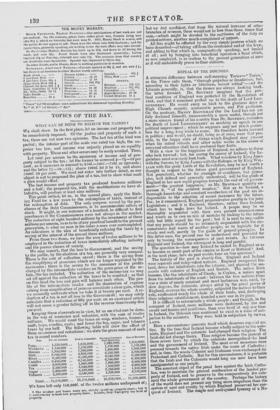TOPICS OF THE DAY.
WHAT CAN BE DONE TO RELIEVE THE NATION?
WE shall show. In the first place, let an income and property tax be immediately imposed. Of the justice and propriety of such a
tax, there are not now two opinions. The last tax of the kind was partial ; the inferior part of the scale was rated too high, the su- perior too low, and income was unjustly placed on an equality with property. These and other errors may be easily avoided. Thus,
Let 100/. per annum be the minimum of income and of pro- perty subject to the tax ; let the former be assessed 6-71-10 per cent., as it increases in amount to 250/.-500/.-750/. or upwards ; and the latter 71-10-14 ; above 10001. let it be 15, and above 50001. 20 per cent. We need not enter into further detail, as our object is not to propound the plan of a tax, but to show what such a plan would effect.
The last income and property tax produced fourteen millions and a half; the proposed tax, with the modifications we have al- luded to, will produce at least nine millions. This point settled, let us, in the second place, apply the Sink- ing Fund for a few years to the redemption of taxes, instead of the redemption of debt. The only purpose served by the pur- chases of the Debt Commissioners, is to accommodate sellers of stock. It might, in one instance of a hundred, be difficult to find purchasers if the Commissioners were not always in the market. The reduction of eight hundred millions by the investment of three millions per annum, so as to be of any practical benefit to the present generation, is what no man in his sober senses ever contemplated. As ridiculous is the idea of beneficially reducing the taxes by a saving of the interest of the annual three millions. From these two items, we have the sum of twelve millions to be employed in the reduction of taxes immediately affecting industry and the poorer classes of society.
We may remark, that the loss to Government, and the saving to the public, by the abolition of a tax, are generally very unequal. There is the cost of collection saved ; there is the saving from the 'simplifying- of processes which are no longer regulated by the exciseman ; there is the saving to the consumer of the profits charged by the intermediate venders on the gross price of the ar- ticle,'the tax included. The collection bf the income-tax we may set off against the collection of the taxes to be remitted ; so that on this head the loss and gain will balance each other. The pro- fits of the intermediate vender and the diminution of expense arising from simplification of process constitute a clear gain, which we assuredly underrate when we take it at twenty per cent. A re- duction of a tax is not all loss to the Government ; we may safely calculate that a reduction of fifty per cent. on an overtaxed article will not cause a greater falling off in the revenue than twenty-five per cent.
Keeping these observations in view, let us see what can be done, in the way of remission and reduction, with the sum of twelve millions. We would remit the taxes on soap, windows, houses,* malt, hops, candles, coals ; and lower the tea, sugar, and tobacco faxes by one half. The following table will show the effect of these remissions and reductions: we state the gross amount of each tax in round numbers.
Tax. Trenni Amount. raid by Consumer. Saving to Consumer Loss to Revenue. • from Redaction.
1,620,0001... 1,620,0001. .. 1,350,000/. 1,150,000 .. 1,150,000 .. 1,150,000 1,300,000 .. 1,300,000 .. 1,300,000 4,560,000 .. 4,560,000 .. 3,800,000 0,240,000 .. 0,240;000 .. 0,200,000 0,540,000 .. 0,540,000 .. 0,450,000 1,080,000 .. 1,080,000 .. 0,900,000 3,840,000 .. 1,920,000 .. 0,800,000 6,480,000 .. 3,240,000 .. .1,350,000 2,640,000 .. 1,320,000 .. 0,550,000 23,450,000/. .. 16,970,0001... 11,850,000/. We have left only 150,0001. of the twelve millions indisposed of;
4, -The window and house taXes are, strictly' speaking, rroperty-taxes ; hut it is unnbcessary to have twb property-taxes. Besides, they :fact kmly One kind of property.
Soap 1,350,0001... Windows 1,150,000 ..
Houses 1,300,000 ..
Malt 3,800,000 .•
Hops 0,200,000 • • Candles 0,450,000 • • Coals 0,900,000 • • Tea 3,200,000 .• Sugar . 5,400,000 • • Tobacco 2,200,000 ..
Total 19,950,000/. ..
but we feel cenfid,ent, that, from the natural increase of other branches of revenue, there would not be less than three times that sum,—which might be devoted to the reoission of the duty on printed cottons, another much-complained of infpOst. •
All this might be effected by the very simple process which we have described—of taking off' from the overloaded end of the lever, and adding to that which is, comparatively speaking, not loaded at all ; and by bringing into beneficial operation a fund which, as now employed, is as useless to the present generation of men as it will undoubtedly prove to their children.


























 Previous page
Previous page